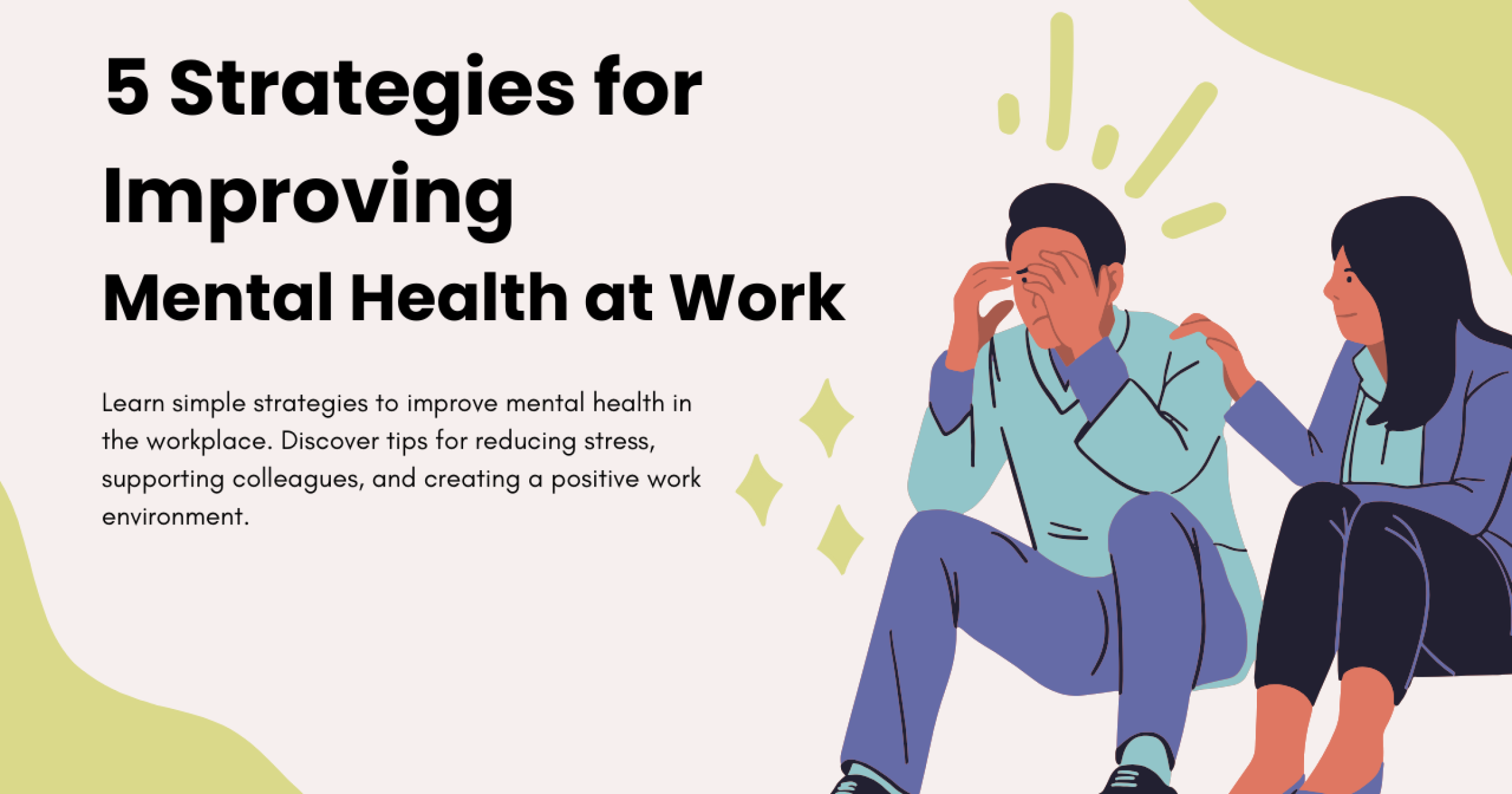Learn Workplace Mental Health Tips and simple strategies to improve mental health in the workplace. Discover tips for reducing stress, supporting colleagues, and creating a positive work environment.
5 Strategies for Improving Mental Health at Work
In today’s busy work world, it’s vital to take care of our mental health while on the job. The stress and demands of work can sometimes be tough to handle. So, it’s crucial for both employers and employees to focus on strategies that can help improve mental well-being at work. Here are five easy ways to do just that:
- Create a Supportive Atmosphere:
Encourage a workplace culture where everyone feels safe talking about their mental health. This means being open, understanding, and respectful when discussing mental health challenges. Managers should lead the way by being supportive and approachable. - Balance Work and Life:
It’s important to find the right balance between work and personal life to avoid burnout. Employers can help by offering flexible work hours, remote work options, and paid time off. Encourage employees to make time for hobbies, exercise, and spending time with family and friends. - Offer Mental Health Support:
Provide access to mental health resources and support services like counseling and employee assistance programs. Make sure employees know how to access these resources confidentially. Train managers to recognize signs of distress and offer appropriate support. - Manage Workloads and Stress:
Avoid overwhelming employees with excessive workloads and stress. Set realistic goals and deadlines, delegate tasks, and encourage breaks throughout the day. Teach stress management techniques like mindfulness and time management. - Create a Healthy Workspace:
Make sure the physical environment supports mental well-being. Ensure good lighting, comfortable temperatures, and ergonomic setups. Encourage movement and breaks, and consider adding natural elements like plants to reduce stress.
By following these simple strategies, employers can create a workplace where mental health is valued and supported. Investing in mental health not only helps individual employees but also contributes to overall organizational success and employee satisfaction. Prioritizing mental well-being at work is essential for creating a positive and sustainable work environment.
5 tips to reduce stress
here are five straightforward tips to help reduce stress:
- Take Deep Breaths: When you’re feeling stressed, focus on your breathing. Inhale slowly through your nose, hold for a moment, then exhale through your mouth. Deep breaths can calm your mind and body.
- Stay Active: Exercise is a great stress reliever. Whether it’s walking, jogging, yoga, or dancing, moving your body releases feel-good chemicals that can lift your mood and reduce tension.
- Make Time for Yourself: Spend time doing things you enjoy, like reading, listening to music, or hanging out with friends and family. Taking care of yourself is important for managing stress and feeling good.
- Practice Mindfulness: Try mindfulness activities like meditation or simply paying attention to your surroundings. Being present in the moment without judgment can help you feel more calm and focused.
- Set Limits: Learn to say no to things that add unnecessary stress to your life. It’s okay to prioritize your well-being and set boundaries to protect your time and energy.
How to feel better physically and mentally
To feel better physically and mentally, try these easy steps:
- Get Moving: Regular exercise helps your body and mind. Even a short walk or stretching session can boost your mood and energy.
- Eat Well: Choose healthy foods like fruits, veggies, whole grains, and lean proteins. Eating right helps your body and mind stay strong.
- Sleep Well: Aim for 7-9 hours of sleep each night. Good sleep helps your body recharge and keeps your mind sharp.
- Relax: Take time to unwind. Try deep breathing, meditation, or just sitting quietly. Relaxing helps reduce stress and makes you feel calm.
- Connect: Spend time with friends, family, or people who care about you. Being with others helps your mental health and gives you support.
- Manage Stress: Figure out what stresses you out and find ways to deal with it. Set limits, prioritize tasks, and take breaks to relax.
- Get Help: If you’re struggling, talk to someone you trust or seek professional help. Therapy or medical treatment can make a big difference.
Taking care of yourself physically and mentally is important. Start with small steps, and remember to be patient and kind to yourself. You deserve to feel good!
causes of mental illness in the workplace
Mental illness in the workplace can happen for various reasons, such as:
- Stress from Work: When workloads are heavy, deadlines are tight, or hours are long, it can lead to stress. This stress can cause anxiety or depression over time.
- Struggling with Balance: Trying to manage work and personal life can be tough. If work takes over, it can lead to feeling overwhelmed and burned out.
- Feeling Insecure About the Job: Worries about losing a job or not being able to find work can make people anxious. This fear can affect mental health.
- Not Getting Enough Support: If bosses or coworkers don’t offer support, it can make people feel alone or unappreciated. This lack of support can hurt mental well-being.
- Dealing with Bullying or Harassment: Being bullied or harassed at work can be very harmful. It can lead to feeling upset or anxious.
- Facing Unrealistic Demands: When bosses expect too much, it can make people feel stressed or like they’re not good enough.
- Not Having Enough Resources: If there aren’t enough tools or people to get the job done, it can lead to frustration and stress.
- Feeling Afraid of Stigma: Some people worry that if they talk about their mental health, they’ll be treated differently. This fear can stop them from getting help.
- Going Through Traumatic Events: Being part of a traumatic event at work, like an accident or violence, can cause mental health problems like PTSD.
- Not Knowing Enough About Mental Health: If workplaces don’t talk about mental health or offer help, it can make it hard for people to know what to do when they’re struggling.
To help with mental health at work, it’s important for employers to create a supportive environment and offer resources for managing stress. This can make a big difference in helping employees feel better and do their best at work.
importance of mental health in the workplace
Ensuring good mental health at work is really important for a few reasons:
- Employee Well-being: When workplaces prioritize mental health, it helps employees feel supported and valued, making them happier and healthier.
- Better Performance: Mental health affects how well people can concentrate, make decisions, and handle tasks. When employees feel good mentally, they tend to do better work.
- Less Time Off: Addressing mental health issues means fewer days off due to stress or anxiety. When employees feel supported, they’re more likely to show up to work regularly.
- Happier Employees: When workplaces care about mental health, employees are more likely to feel connected to their job and enjoy what they do.
- Staff Retention: Companies that take mental health seriously tend to keep employees longer because they’re happier and feel valued.
- More Creativity: Feeling mentally well boosts creativity and innovation, leading to new ideas and solutions to problems.
- Good Reputation: Businesses that support mental health are seen in a positive light by employees and others, making them attractive places to work.
Overall, taking care of mental health at work is a win-win situation for both employees and employers.
More about workplace stress management.
Here are some simple tips for managing stress at work:
- Plan Your Time: Make lists or use calendars to organize tasks and manage your time better.
- Take Breaks: Remember to take short breaks during the day to relax and recharge.
- Communicate Clearly: Be open and clear in your communication with colleagues to avoid misunderstandings.
- Resolve Conflicts: Address any conflicts or problems calmly and find solutions together.
- Seek Support: Don’t hesitate to ask for help or talk to someone if you’re feeling stressed.
- Be Flexible: Try to find ways to work that suit you, like flexible hours or working from home.
- Take Care of Yourself: Make sure to eat well, exercise, and get enough rest outside of work.
- Appreciate Others: Show gratitude and appreciation for your colleagues’ efforts and achievements.
- Set a Good Example: Lead by example by practicing healthy habits and encouraging others to do the same.
- Stay Positive: Focus on the positives and try to maintain a positive attitude, even during challenging times.
These simple strategies can help you manage stress and feel better at work.
Symptoms of mental health issues in the workplace
Recognizing signs of mental health issues at work is important. Here are some common signs to look for:
- Changes in Behavior: Noticeable changes like being more irritable, moody, or withdrawing from others.
- Performance Decline: Doing work less well than usual or having trouble staying focused.
- Absences: Missing work often or being late without a good reason.
- Trouble Concentrating: Finding it hard to focus, make decisions, or remember things.
- Emotional Outbursts: Having frequent emotional reactions like crying or getting angry.
- Physical Issues: Complaining of headaches, feeling tired, or having stomach problems.
- Neglecting Appearance: Not taking care of personal hygiene or showing changes in weight.
- Increased Substance Use: Using alcohol, drugs, or medications more than before.
- Isolation: Avoiding talking to others or spending a lot of time alone.
- Loss of Interest: Not being interested in work tasks or projects anymore.
- Struggling with Change: Having a hard time adjusting to changes at work.
- Excessive Worry: Feeling overly anxious or stressed about work-related things.
If you notice these signs in yourself or others, it might be a good idea to seek help or support. Creating a supportive workplace where people feel comfortable talking about mental health is really important.
Conclusion
To sum up, taking care of mental health at work is crucial for everyone’s well-being. By recognizing signs of mental health issues and offering support, employers and coworkers can make a big difference. Simple steps like raising awareness, providing access to counseling, and creating a supportive atmosphere can really help. When workplaces prioritize mental health, it makes for happier and more productive employees. So, let’s work together to make mental health a priority in the workplace!




